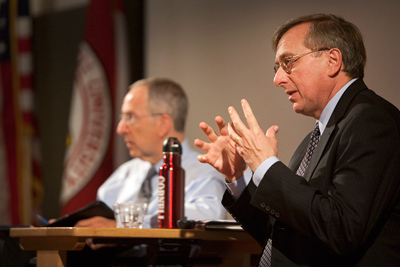University to save at least $90 million annually, thanks to administrative streamlining
By Susan Kelley

Cornell expects to save at least $90 million in annual administrative costs over the next four years, making a significant dent in its projected 2015 budget deficit of $135 million, Provost Kent Fuchs announced Oct. 1.
The savings will come from long-term operations efficiencies in areas including procurement, information technology, facilities, utilities and simplifying the university's complex organizational structure, Fuchs said.
"The president has indicated that we'll have to have business practices that are different," said Fuchs. "We won't centralize everything, but we will have business practices that will allow us to achieve at least $90 million in savings that won't touch the academic core of the university."
Fuchs made the announcement at the fourth of five forums he and President David Skorton are holding this semester for staff, faculty and students to discuss the university's strategic planning process, called Reimagining Cornell. The university would have had a projected $215 million annual deficit by 2015 had it not begun to take action 13 months ago.
An estimated one-third of the $90 million in savings would come from a more cohesive procurement process. Cornell now spends almost $1 billion a year purchasing goods and services including those for construction projects, said Joanne DeStefano, vice president for finance. In a streamlined method, faculty and staff could buy goods and services from select vendors, said Deputy Provost David Harris, who is overseeing the work of an outside consulting firm hired by the university to analyze its nonacademic business practices.
The details of how to fully realize the potential in savings are still being worked out. The efficiencies won't happen immediately, or even in the next year, Fuchs said. "It will take time for us to change the way we implement these business practices."
But the administration plans to offer opportunities for faculty, staff and students to continue to participate in the decision-making, Harris said. "People should not worry that all of a sudden they're going to wake up and find that Cornell has changed dramatically."
As the consultants finish their project in the next five weeks, 20 task forces continue to develop recommendations to refocus the university's academic aspects.
Finalized guidelines, which Skorton announced at the forum, will give the task force parameters to direct decision-making, Skorton said. (They can be seen at the Reimagining Cornell Web site.) "We thought it was very, very important that we share these widely on campus."
Perhaps the most radical guideline is one that states that decisions should favor colleges and individual units, Skorton said -- but if a conflict arises, decisions should favor the university. "The university is the entity that has been here since 1865 and is going to be here for a very long time in the future," Skorton said.
The administration hopes the task force recommendations will help close the remaining $45 million budget gap. As the markets continue to recover, the administration also expects a boost from an increase in philanthropy and improved endowment performance, Fuchs said. "Time will help, we believe."
A question-and-answer period followed.
Will units have to meet staff reduction quotas? "We're not going to have some arbitrary, across-the-board target," Skorton said. Each unit's staffing situation will be different, depending on its focus and value to the university's mission, he said. "I wouldn't try in any way to mislead you or soft-pedal this: Many, many areas in the university have reduced their expenditures based on layoffs, and there certainly will be more personnel actions at the university."
How will such considerations as environmental and social concerns factor into the decision-making? The question cut to the very heart of the university's peculiarities: It is a huge employer in a small area and has a long tradition of making decisions not just on the basis of the bottom line, Skorton said. "Absolutely, we're going to have to find a way to deal those in, but in a fashion that will not trump our need to make massive non-personnel savings."
Other questions focused on the university's role in formulating national policy, avoiding work redundancies and how the president plans to do his work with a reduced staff.
As they have in all of the previous forums, Skorton and Fuchs took notes and encouraged the audience to offer feedback.
All the forums are streamed live and archived at CornellCast.
Media Contact
Get Cornell news delivered right to your inbox.
Subscribe